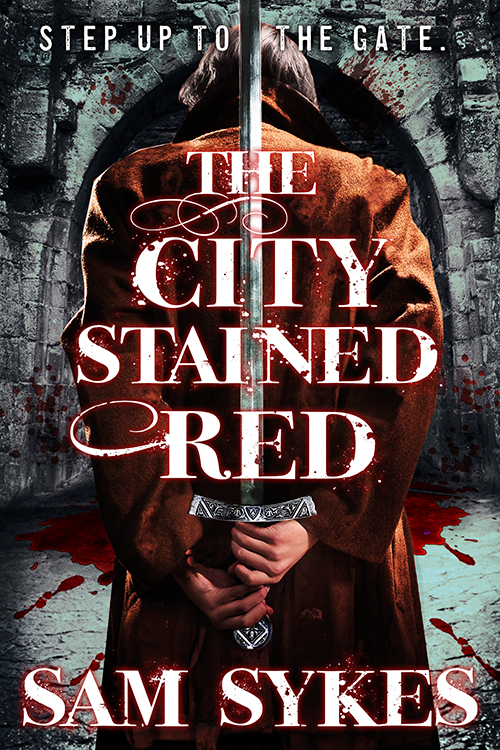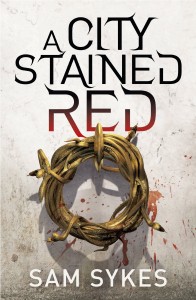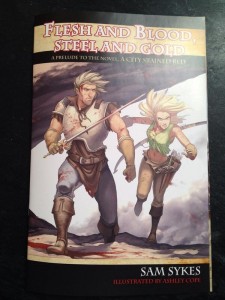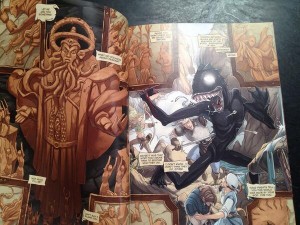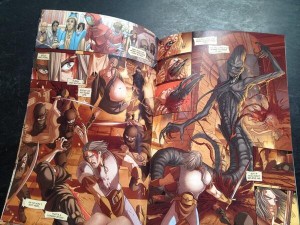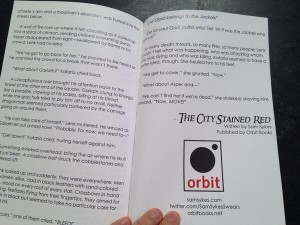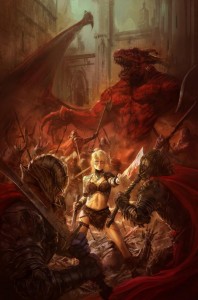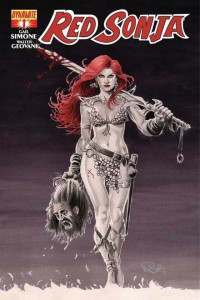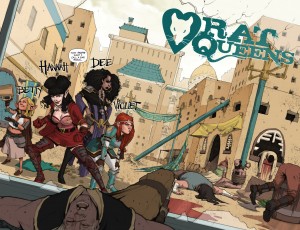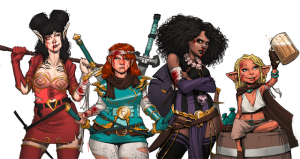Today, I would like to talk about writing influences.
I really don’t like doing these posts, usually, because they almost always turn out to be like the kind of thing discussed by John Scalzi in his blog post: The Orthodox Church of Heinlein. That is, a bunch of people quite comfortable wallowing in their reverence of tradition and absolutely, utterly horrified at the idea that people might not have read the scriptures.
But since I just came from Phoenix Comicon, I’m feeling energized enough to talk about something different.
I love Comicon. Not just because I get a lot of fun panels where I make Myke Cole puke, nor because fans give me assorted baked goods, nor even because I get to see good friends like Scott Lynch, who in fact inspired this blog post (more on that in a second). Rather, it’s because it gives me the chance to see just how sweeping geekdom is. Here, comic book readers rub shoulders with novel readers bump elbows with cosplayers touch butts with video gamers. All of them are sharing their enthusiasm and all of them are potential readers.
I’ve always been a proponent of the mixed media crowd. If you’re writing fantasy today, then chances are very good that you’re writing for someone who consumes a variety of media. There’s fewer diehard Heinleinists and more people who are diverse, passionate and vigorous about what they consume and that’s very good news for an author.
To that end, I’m not sure why I’ve always been so reluctant to acknowledge the diversity of media in my influences as a writer. I guess it’s because when Tome of the Undergates came out, bloggers were lining up to decry its video game-iness. I guess I wanted to distance myself from that. But this was a long time ago: before I stopped giving a shit, before I started making an effort to not be ashamed of what I liked, before I started really considering what made me interested in writing.
And that’s why I decided to make a post about what video games influenced me as a writer.
Of course, Scott beat me to the punch by acknowledging his protagonist as being an homage to Final Fantasy VI.
That authors are influenced by video games should probably not be a surprise. If we accept that our audiences are growing more diverse then we must also accept that our influences are following. And if we accept that story is important to a video game, we must also look to appreciate them as art and all the impacts on our lives they have as an art.
Without further ado, here are the top four video games that have influenced me as a writer.
4. Icewind Dale II
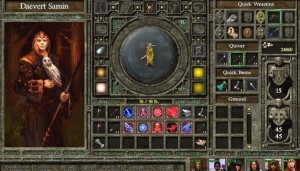
That’s right, motherfuckers. Takin’ us back to the days of Vista!
Anyone who has read my books knows my opinions of adventurers: they are low-class, unscrupulous assholes who would gladly break into your house, steal all your shit and kill you for no reason than you happened to possess enough financial savvy to have accumulated a small nest egg. Icewind Dale II (or at least, the way I played Icewind Dale II) helped shape that perception.
As the brutish, less attractive cousin of Baldur’s Gate, Icewind Dale II was a game that gave you carte blanche to pillage your way across the frozen north of the Forgotten Realms. There was no problem that could not be solved by violence and no violent solution that did not have repercussions. While Baldur’s Gate was a professor’s long-winded lecture on morality, Icewind Dale II was a frowning mother sitting in the corner, quietly drumming her fingers on her knees as she watches her baby pound shot after shot of bourbon.
In many ways, this game showed how relative morality is. The guys you happened to kill were mostly evil, but if there had been an orphan with a +3 Sword of Wounding, you would have beat him to death with his own kitten to get it.
Why Icewind Dale II instead of Icewind Dale? Because 3e is better. Come at me.
3. God of War
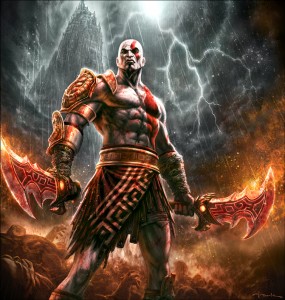
I’ve probably mentioned this before, but I love God of War. Possibly more than is healthy.
I loved it when it first came out for the PS2, loved it so much I smashed a controller when I got to the bladed pillars of Hades. I loved it more when its sequel hit and I got to beat the shit out of a colossus. The third installment was one of the major reasons I bought a PS3. I own both sequels for the PSP and I loved it so much it broke my heart when the shit that was Ascension came out.
Now, no one plays God of War for its story. There’s only so many ways you can phrase “Kratos is pissed at the gods and is out to wreck shit.” Nor does anyone play God of War for its puzzles, its vehicle sections or its minigames in which you have sex with a number of people. From those aspects of God of War, I took nothing to my storytelling. But God of War does one thing and it does it very well and from God of War, I learned combat.
It’s weird. Prior to this game, the apex of my experience with combat had come from R.A. Salvatore. Drizzt’s numerous flurries and parries got into my head and Salvatore’s technical prowess when describing fights was awesome. And yet it felt so…sterile. Every mention of the word “feint” made my eyes glaze over. God of War made things visceral, taught me how to keep a scene moving with short, vicious sentences (a lesson I hadn’t quite learned by Tome’s debut). More importantly, it made me consider how a man would actually fight a monster six times his size. How would he act to a blow that could kill him at once? Where would he strike a giant demon?
Now, there’s certainly room for long, fancy footwork in fight scenes (Douglas Hulick does this very well), but it’s not the kind of fight I wanted to write. God of War helped me discover what I was looking for in a real monster of a battle.
2. Final Fantasy VII
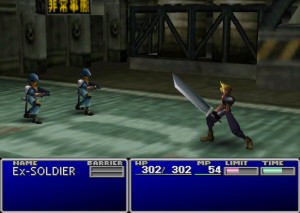
You had to have seen this coming, right? How could you not? You’d need all the fingers of every Cid to count how many people hold this up as one of the pinnacles of RPGs.
Truth is, for a long time, I wasn’t sure why this game was so important to me. Its plot is considerably convoluted, even for a JRPG. Its characters are not particularly interesting, unless you’re especially into introspective angst by spiky-haired gentlemen. The visuals certainly aren’t stunning. So I voiced this to my friend Carl one day, who came up with a pointed answer.
Prior to FFVII, most of us had just been sort of playing video games. We knew Mario had a reason for being on Dinosaur Island, but we didn’t give a shit. We knew that Sonic the Hedgehog probably had people he loved and hated, but who the fuck cared. FFVII was by no means the first video game to have a story, nor even the first video game to have an interesting story, but it hit around the time when a lot of kids who had grown up with video games were just starting to be able to recognize story, character and plot. We weren’t used to one plot arc, let alone several: Shin-Ra’s destruction of the planet, Cloud’s identity issues, the growing love triangle and so forth. For a lot of kids, FFVII was the first video game we played to find out what happened next.
So yeah, it’s safe to say that FFVII influenced me in a lot of core ways. If DeviantArt is any indication, it did the same for a lot of people. I’m not reluctant to admit that.
If I am reluctant to admit anything, it’s that I liked Tifa more than Aeris.
But if FFVII was one of the apexes of my video game influence, then my next one must be the primitive spark that started it…
1. The Legend of Zelda: A Link to the Past
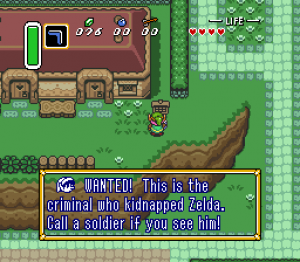
Yeah.
Now, this might seem strange, given that any LoZ game has only one story that just repeats itself over and over. But back when I first got into video games, LoZ fucking blew my mind. Fantasy stories! I was the hero! Princesses! I was the hero! Giant suits of armor! I was the hero! Me! I could be the hero!
I actually keenly recall the night I first played this game, having rented it from Blockbuster after they were out of Battletoads. I remember popping it in, having no real clue of what I was doing, but entranced all the way. I remember begging my mom not to return it. I remember saving up so I could order it (in its authentic gold cartridge) from a magazine. I remember it starting a love affair with Zelda that would haunt me forever and eventually end in me getting teary-eyed when describing Ocarina of Time.
Sure, the games are repetitive. Sure, the characterization is non-existent. But to my tiny, 12-year-old brain, this was fucking amazing. The story of Zelda is extremely simple, but I think it’s those simplistic, primal elements that form the pillars that support our love of loftier goals. The love of exploration, the fear of what might lurk in the darkness, the desire to fight against a power so vast it spans worlds: all this and more can be found in my writing and I don’t think I’d give it up.
So there you have it. My top four. If you’re at all like me, I suggest you consult for yourself what yours might be!
